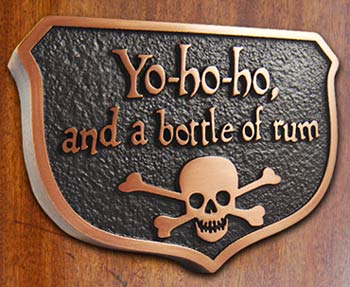An analysis of The Derelict - the most famous pirate poem of all time.
The words “you ho ho and
a bottle of rum” may be the most piratical, and the most famous, in all of
literature. Many people. Including some folks who perform the song regularly, believe
that it’s a real pirate song, sung by real pirates 300 years ago.

This isn’t quite true. But the song and its origins IS tied up with the legends of piracy.
The words “Fifteen men on
the Dead Man’s Chest, Yo ho ho and a bottle of rum” appear first in Robert
Lewis Stevenson’s 1883 novel, Treasure
Island. In this famous tome, the words are the refrain of an old drinking
song sung by members of Flint’s crew on his ship, the Walrus.
The words supply some
early atmosphere, as the renegade pirate Billy Bones sings them to himself while
he wanders the shore, keeping a wary lookout for this former shipmates, bound
on revenge.

Later, it reveals the bond
between Billy and his former shipmates. The words themselves are ominous,
touching on death, treasure, the brotherhood of pirates (now breached by Billy)
and the pirate’s favorite source of celebration and mayhem, rum.
Stevenson never wrote
more than these few tantalizing tidbits. It fell to a newspaper man and sometime
songwriter to Young Ewing Allison to complete the work. He wrote the entire
lyric, and it was performed in the play Treasure Island, which debuted in 1901.
 |
| Young Ewing Allison |
The Derelict
Fifteen
men on the Dead Man's Chest—
Drink and
the devil had done for the rest—
The mate
was fixed by the bos'n's pike,
The bos'n
brained with a marlin spike,
And
Cookey's throat was marked belike
It had
been gripped
By
fingers ten;
And there
they lay,
All good
dead men
Like
break-o'-day in a boozing-ken—
Yo-ho-ho and a bottle of
rum!
Fifteen
men of the whole ship's list—
Dead and
be damned and the rest gone whist!—
The
skipper lay with his nob in gore
Where the
scullion's axe his cheek had shore—
And the
scullion he was stabbed times four.
And there
they lay,
And the
soggy skies
Dripped
all day long
In
upstaring eyes—
In murk
sunset and at foul sunrise—
Yo-ho-ho and a bottle of
rum!
Fifteen
men of 'em stiff and stark—
Ten of
the crew had the Murder mark—
'Twas a
cutlass swipe or an ounce of lead,
Or a
yawing hole in a battered head—
And the
scuppers glut with a rotting red
And there
they lay—
Aye, damn
my eyes—
All
lookouts clapped
On
paradise—
All souls
bound just contrariwise—
Yo-ho-ho and a bottle of
rum.
Fifteen
men of 'em good and true—
Every man
jack could ha' sailed with Old Pew—
There was
chest on chest full of Spanish gold,
With a
ton of plate in the middle hold,
And the
cabins riot of stuff untold,
And they
lay there,
That had
took the plum,
With
sightless glare
And their
lips struck dumb,
While we
shared all by the rule of thumb—
Yo-ho-ho and a bottle of
rum!
More was
seen through the stern light screen—
Chartings
no doubt where a woman had been!—
A flimsy
shift on a bunker cot,
With a
thin dirk slot through the bosom spot
And the
lace stiff dry in a purplish blot.
Oh was
she wench…
Or some
shuddering maid…?
That
dared the knife—
And took
the blade!
By God!
she was stuff for a plucky jade—
Yo-ho-ho and a bottle of
rum!
Fifteen
men on the Dead Man's Chest—
Drink and
the devil had done for the rest—
We
wrapped 'em all in a mains'l tight
With
twice ten turns of a hawser's bight
And we
heaved 'em over and out of sight—
With a
Yo-Heave-Ho!
And a
fare-you-well!
And a
sullen plunge
In the
sullen swell,
Ten
fathoms deep on the road to hell!
Yo-ho-ho and a bottle of
rum!
The song
describes a bloody scene on a derelict ship. In the first verse, we see that
the first mate has been murdered by the bosun, using one of the bosun’s classic
tool. In turn, the bosun has been killed by one of his own subordinates. We know this, once again, from the tool used
for the murder. It is a marlin-spike, the tool of the sailors who work under
supervision of the bosun, maintaining the ropes and sails. The ship’s cook has
been strangled. Dead men lay all over, like partiers after a long night of
drinking, a macabre comparison with these corpses.

In the second verse, we note that anyone besides the corpses has fled the scene. “whist” being a turn-of-the-century contraction for “I know not where” The carnage has killed the captain – the most powerful man on the ship – and also the scullion, a position of unskilled kitchen help, probably the lowest person on board.
Once
again, the observer describes the mayhem – death by strike of a cutlass (sword)
or an ounce of lead (the bullet from a pistol of the time.) The scuppers –
devices that drain water from the surface of the deck, are clogged with rotting
blood. The dead lay with their eyes open, staring into a raining sky, as if
looking toward heaven. But the observer know that anyone who has done these
deeds will certainly go the other way.
 |
| Blind Pew |
A quick
remark to the pirate Pew, a character in Treasure
Island. But what did the men fight over? Chests full of Spanish gold, and a
ton of plate – from the Spanish word plata
meaning sliver. When pirates refer to “plate” they mean bars of cast
silver. The “stuff” referred to would be cloth – probably bolts of silk. The
men who captured all this treasure (the plum) are dead, but the observer and
his friends are happy to share it among themselves.
One more
source of conflict can be found – a woman was in the stern cabin, usually the
home of a ship’s captain. Her remains show her death, a stab wound through the
breast of her nightgown. Was she a prostitute? Or a terrified virgin? The
speaker does not know, but admits that she must have died with courage (pluck.)

The observer
and his friends wrap the corpses in sailcloth, tie them with sturdy rope (the
hawser) and give them the traditional burial at sea. The dead are going to
hell, and the living may follow. But for now our observer and his friends have
a huge amount of treasure, and probably plan on celebrating.
As an addition to the story of Treasure Island the song suggests how
Flint and company may have found their enormous treasure. The story of murder,
gold, and drink sets a perfect tone. But I’d like to add another note.
I believe
that the scene described tells the story of a privateer’s crew, not a pirate
vessel. Privateers divided their treasure unequally, with the captain and
officers getting a much larger share. A privateer would also be much more
likely to supply the captain with a private cabin (pirates did not allow the
captain private use of the large stern cabin) A privateer captain was also more
likely to keep a mistress on board.
This
concept lends one more element of grim humor to the scene. If the original
holders of the treasure were “honest” privateers, who broke out in rebellion
over the uneven distribution of such a huge treasure, they had broken their own
laws, died by murder and damned their souls to hell.
In the meantime,
the pirates – honest thieves – divided the treasure evenly and sail away happy.
What is the tone?
ReplyDeleteyrhrg
ReplyDeleteywhwsshdy4r
ReplyDeletefgjkbjbohbyhkhbu9otug
ReplyDeleteSo interestingg
ReplyDeleteI understand all except for a few lines
ReplyDeleteDrink and “the devil had done for the rest”
The skipper lay “with his nob in gore”
10 of the crew had their “murder mark”
A “yawing hole” in a battered head
And the “cabin’s riot” of stuff untold
Can someone explain these lines to me? The breakdown doesn’t. Also what exactly is the “Dead Man’s Chest”? Is it referring to the ship? Is it referring to the treasure that they are all “on”? Were there 15 men literally stacked atop a dead man’s chest?
"drink and the devil had done for the rest" basically playing on taking a drink for the deceased, basically saying due to the evil deeds the dead had committed, they are with the devil now.
Delete"Nob in gore" well, it could be the British slang meaning his, er, genitals we're gored (stabbed through messily) although perhaps nob could mean something else, but either way, he was gored.
"Yawing hole" well, yawing, in terms of sailing, meant the ship was moving side to side or off course, so it implies the whole was uneven and was split side to side.
"15 men on the whole ship's list"
Strongly implies The Dead Man's Chest was the name of the ship, and that a total of 15 men crewed the ship. "Dead and be damned and the rest gone whist" an unspecified number were dead, while the rest were missing "10 of the crew had the murder mark" gives us the number of dead vs missing. "Murder mark" simply just means it's obvious they were murdered and didn't die of some other causes. Whether or not the 5 missing crew mates survived and fled or any number of the 5 had been tossed overboard when killed is unclear.
Drink and the devil had done for the rest: the living drink up and the devil had had his way with the rest.
DeleteNob in gore: a nob is a 19th century slang term for a head. The captain had his head bashed in.
Murder mark: the Black Spot. A circle of black paper cut from the inner page of a Bible designated to the recipient as a sign that their days are limited
Yawing hole: if a ship receives a huge cannon shot or runs, say, into an iceberg, the large hole woul take on water and cause the ship to list
The cabin’s riot: a large amount of goods like silks have been thrown everywhere
The Dead Man’s Chest is an island in the Caribbean off the British Virgin Islands long associated with Pirate activity. Yo Ho
ReplyDeleteI’m happy to see the issue is soon regulated.